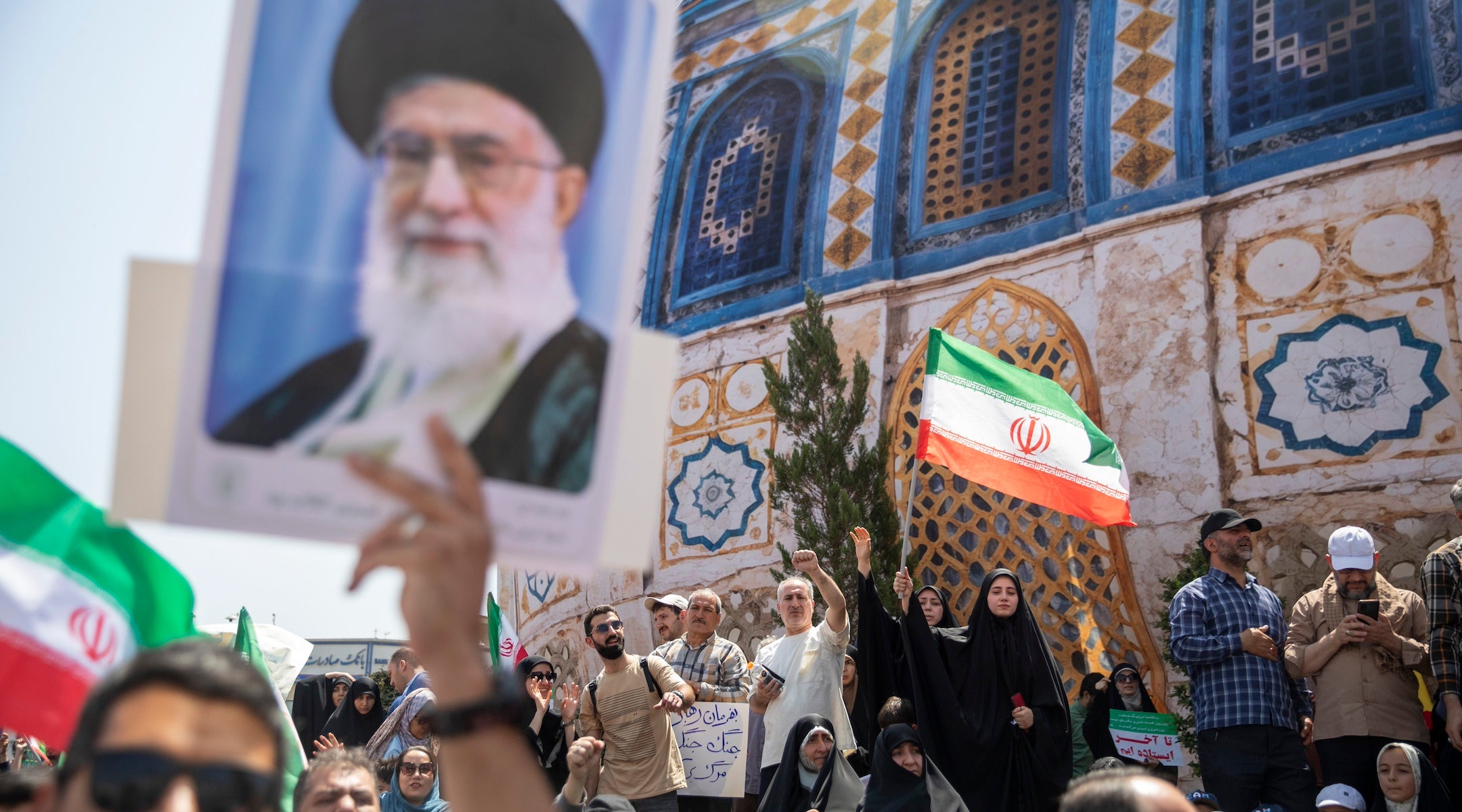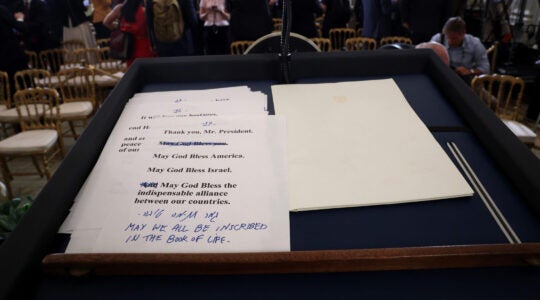WASHINGTON — The last time Israel bombed a nuclear facility in a hostile country, its hopes for what would come next were clear: The regime it deemed too toxic to have nuclear power should stay in place.
A lot has changed in the Middle East since 2007, when Israel took out the nuclear reactor in Syria, then led by Bashar Assad. While he was one of Israel’s most implacable enemies, Israel made clear it preferred a Syria led by Assad than not.
For decades, Israel was wary of regime change in Syria and other neighboring countries, preferring a menacing stability to whatever might replace it. Middle East analysts say that changed on Oct. 7, 2023, when Hamas, funded and trained by Iran, invaded Israel and massacred close to 1,200 people, launching the current war in Gaza.
Israel’s shedding of its former reluctance to bring about regime change is behind the attacks Israel launched on Iran on June 13, said Dan Shapiro, who was ambassador to Israel under President Barack Obama.
“Post Oct.7, the environment has changed,” said Dan Shapiro, who is now a distinguished fellow at the Atlantic Council’s Middle East Security Initiative.
“The Israeli thinking that threats that were otherwise recognized but sort of tolerated or managed or addressed through a kind of a mowing of the grass strategy are no longer considered tolerable,” he said. “The Israeli perspective is they need to be addressed before they reach the last minute, before they can threaten you.”
Israel is not explicitly calling for the overthrow of the theocracy in Iran. In his only interview in Hebrew since Israel launched attacks on Iran’s known nuclear sites, Israeli Prime Minister Benjamin Netanyahu would not count out regime change as an outcome of the conflict, but emphasized that it was not a strategic goal.
“Our first goal is the nuclear threat, to remove it. We are in the process of removing it. The second is to remove the ballistic missile threat; we are in the process of removing it,” Netanyahu said last Thursday on Israel’s government-owned Kan news.
“The issue of removal of the regime, the fall of this regime is first and foremost an issue for the Iranian people, so I have not presented it as a goal, it could be an outcome, but it is not a formal goal,” he said.

A sign denouncing Bashar Assad, president of Syria, is displayed at a rally at the United Nations General Assembly in New York City, Sept. 26, 2012. (Mario Tama/Getty Images)
Others in his government have gone further: Netanyahu’s defense minister Yisrael Katz, on the same day the prime minister spoke to Kan, said Iranian Supreme Leader Ayatollah Ali Khamenei was a “modern Hitler” who “must not continue to exist.”
And this week, after the United States joined the conflict alongside Israel, President Donald Trump — who for years reviled the regime change in Iraq secured by one of his predecessors, George W. Bush — seemed intrigued by the idea.
“It’s not politically correct to use the term ‘Regime Change,’” he posted on Truth Social, ”but if the current Iranian Regime is unable to MAKE IRAN GREAT AGAIN, why wouldn’t there be a Regime change? MIGA!!!”
In years after destroying the Syrian reactor, Israeli officials said they did not trust Assad — but saw him as the devil they knew. For years following the U.S.-led removal of Iraqi dictator Saddam Hussein, the Middle East was roiled by Islamist insurgents, each more extreme than the previous.
“I prefer the political extremism of Assad over religious extremism,” Ayoub Kara, then a top official of Netanyahu’s Likud Party, said in 2011 as Israel warily watched a civil war unfold in Syria. “We don’t want religious extremism on the border.”
With rare exceptions, Israel has since its inception always been wary of regime change — because the new kid on the block is frequently worse than the one he replaced. That was the case with the radical nationalists who in the 1950s and 1960s replaced the Arab leaders installed by Britain and France as they downsized their empires.
Arab nationalism helped fuel the 1967 Six-Day War, which Israel saw as existential. In 1970, when Israel and Jordan were still enemies, Israel intervened on behalf of the kingdom to keep Palestinian radicals from overthrowing King Hussein.
The rise in the 1970s of political Islamism only entrenched Israeli wariness of change: What at first blush seemed like a democracy replacing Iran’s repressive monarchy in 1979 soon revealed itself as a theocracy implacably hostile to Israel’s existence.
Two years later, Israel nervously watched after an Islamist assassinated Egypt’s president, Anwar Sadat, who had forged the first peace between Israel and an Arab nation.
The irony was not lost on Israel’s establishment: Sadat, the strident nationalist who in 1953 with Gamal Abdel Nasser had overthrown a relatively moderate monarchy, was killed by an even more implacably Israel-hating Islamist.
Hosni Mubarak, Sadat’s deputy and successor, kept the uneasy peace, but in 2012, when the Muslim Brotherhood emerged triumphant after ousting Mubarak, Israel braced for the worst.
The Muslim Brotherhood president, Mohammed Morsi, maintained the peace, but Israel breathed a sigh of relief when he was ousted by a Mubarak-style general, Abdel Fatha al-Sisi, a year later.
As for Iraq, in 1992 Israel contemplated assassinating Saddam, in retaliation for the missiles he launched at Israel the previous year, but abandoned the plan after a botched rehearsal. Netanyahu in 2002 testified in Congress in favor of replacing Saddam; at the time he was not in elected office, and did not represent an official Israeli view.
Netanyahu has for years resisted the dismantling of the Palestinian Authority, although he reviles its leadership, in part because Hamas — and worse — are waiting in the wings.
The main exception to Israel’s regime change aversion, the war it launched in 1982 against the Palestine Liberation Organization in Lebanon, ended up proving the rule.
Israel’s efforts to install a friendly Christian regime soon collapsed amid assassinations and massacres. Indigenous Lebanese fury at Israel’s occupation of parts of southern Lebanon fueled the rise of Hezbollah, the extremist Islamist terrorist group that conducted multiple wars against Israel, even after Israel ended its presence in the country in 2000.

Thousands of demonstrators express support for Hezbollah in Beirut, Lebanon on Dec. 10, 2006. (Wikimedia Commons)
“That seared into the consciousness of Israel, that it’s very hard to politically engineer an Arab country if you’re a Jewish state,” said David Makvosky, a member of the Obama administration’s Israeli-Palestinian peace brokering team in 2013-2014 who is now a distinguished fellow at the Washington Institute for Near East Policy think tank.
“That’s why Israel has stayed away” from regime change, said Makovsky — and he noted, has yet to fully embrace it, a posture underscored by how careful Netantyahu was in his interview on Kan.
Israeli officials have put out the word that Netanyahu does not embrace Defense Minister Katz’s call for Khamenei’s elimination, Makovksy said.
“Regime change is a whole other kettle of fish, and Iran is such a complicated place with all these different ethnic groups, it’s not at all homogeneous,” Makovsky said. “And, you know, there’s not even an armed group that could take over. It’s a can of worms.”
Jonathan Schanzer, the vice president of the Foundation for Defense of Democracies, said Israel’s preeminence since Oct. 7 in its war against Hamas and Hezbollah, and its successes in its recent attacks on Iran, made the prospect of regime change more palatable.
“The idea of creating something else in its place, or at least just destroying the edifice of this regime, would probably give Israel room to breathe, which that, in and of itself, is big,” Schanzer said
He said one likely outcome would be to cut the lifeline to the network of extremist militias that have targeted Israel and the United States.
“They all lose their patrons. They all lose their arms providers. They all lose their cash providers. They all lose the ideological driver of everything that they’ve been doing against Israel for decades, and so yeah, it makes sense for regime change,” he said.
Israeli caution about regime change in the past had to do with instability on its borders, Schanzer said, but whatever chaos regime change in Iran triggers would take place more than a thousand miles away, he said.
“It’s so far off, it’s almost hard to understand how this would have an impact on Israel,” he said. What’s more, he said, much of the negative American associations with regime change have to do with the extended U.S. presence in Iraq and Afghanistan. No one is calling for U.S. or Israeli “boots on the ground” in Iran.
Gayil Talshir, a lecturer in political science at the Hebrew University of Jerusalem, said Netanyahu had silenced Katz and others in the government who were openly clamoring for regime change — and was wise to do so.
“The framing coming from Netanyahu is, this is something that the Iranian people have to do from within, it’s not something that Israel wants to cause from the outside,” she said.
“Israel should not be the one to instigate it or to talk politically openly about it, because Israel wants to be part of the economic and the prosperity horizon of the Middle East,” said Talshir, “but it doesn’t want to be looked like the instigator of you know, ‘we decide who is the leader of which of which country’.”
Schanzer noted that if anything, what eventually happened in Syria made the case for regime change. An Islamist insurgency ousted Assad last year — and has shown no appetite for antagonizing Israel.
“The Assad regime falls, and now all of a sudden, you don’t have a regime that wants to destroy Israel,” he said.
JTA has documented Jewish history in real-time for over a century. Keep our journalism strong by joining us in supporting independent, award-winning reporting.






